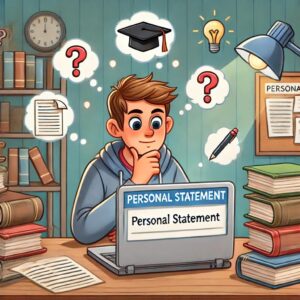
Deciding to attend graduate school is a huge decision, and from the moment you begin this journey, it’ll be clear that your personal statement is the centerpiece of your application. More than any other single aspect, it signals your interests, describes your past, and advocates for your place and fit within the program you’re applying to. A compelling graduate school personal statement explains your intellectual journey, provides insights in your research interests, and offers a glimpse of what you aspire to do and become after completing graduate school. In this post, we address ten common questions about graduate school personal statements, offering guidance on how to craft a standout essay that effectively showcases your strengths and aspirations.
1. What is the purpose of a graduate school personal statement?
The purpose of a graduate school personal statement is to provide the admissions committee with a detailed understanding of your background, motivations, and goals. It allows you to explain why you are interested in the program, how your experiences have prepared you for graduate study, and what you hope to achieve. It is more than just a narrative version of your CV; it is the story that explains your personal and intellectual journey. This essay helps the committee assess your fit for the program and your potential for success in the field.
(note: many schools have both a personal statement and a statement of academic interest. This Essay is mostly for people applying to schools that have just the personal statement. If you want more information on tips for schools that ask for both, check this out)
2. How should I structure my graduate school personal statement?
There are many ways to do this, and so long as you cover the basics, it’s not necessarily required that you follow on particular structure. Here is one that you can use, at least as a starting point:
- **Introduction:** Start with a compelling story that captures the reader’s attention and introduces the main theme of your essay. Avoid being too gimmicky or dramatic. People talk about “hooks” but to be honest, that’s high school writing. Mature writers know how to ease back and let your story do the work without all the silly fireworks and cheesy intros.
2. **Body:** Divide the body into several paragraphs, each focusing on a specific aspect of your background, experiences, and goals. Use this section to provide detailed examples and reflections.
3. **Conclusion:** Summarize the key points of your essay and reiterate how the program will help you achieve your career aspirations. End with a strong closing statement that leaves a lasting impression.
Since most people apply to multiple schools, a good rule of thumb is to have the first 2/3 of your essay be usable for every school, and the last third be specific to a particular program. That way you can customize. Here is more details on how to repurpose a single essay for multiple schools!
3. What should I include in the introduction of my personal statement?
The introduction of your personal statement should provide a clear and concise overview of your motivations and goals. Start with a compelling compelling personal anecdote or a significant experience, that captures the reader’s attention. Briefly introduce the main theme of your essay and provide a roadmap for what to expect in the rest of the document. The introduction should set the stage for your narrative and engage the reader from the outset. You will eventually transition (usually in the middle third of the text) into a detailed and granular engagement with the subject matter, your thoughts on it, and the questions you hope to explore… but I’ve found that the best essays first establish that you’re passionate about the subject and excited to explore it. It should feel meaningful to you.
4. How can I highlight my research interests in my personal statement?
To highlight your research interests, discuss specific projects or topics you have worked on and how they have influenced your academic and career goals. Explain why these areas of research are important to you and how they align with the program you are applying to. Mention any relevant coursework, research experiences, or academic achievements that demonstrate your commitment and expertise in your field of interest.
5. What are common mistakes to avoid in a graduate school personal statement?
Common mistakes to avoid in a graduate school personal statement include:
1. **Being Vague:** Provide specific examples and detailed descriptions rather than broad generalizations. Remember, your readers are usually professors who work in this space, so feel free to “nerd out” on hyper-specific questions and convey how excited you are to dig into these subjects.
2. **Lack of Focus:** Ensure your essay has a clear and coherent narrative. Avoid jumping between unrelated topics.
3. **Neglecting to Proofread:** Spelling and grammatical errors can detract from your professionalism. Proofread your essay multiple times and consider having others review it.
4. **Overemphasis on Achievements:** While it’s important to highlight your achievements, balance this with reflections on your growth and areas for improvement. In the end, you’re telling the reader why you want to search for more answers in this space, so begin from the perspective that you DO NOT have all the answers, but are eager to look for them.
5. **Ignoring the Prompt:** Ensure your essay addresses the specific question or prompt provided by the application. Most personal statements are open-ended, but if they’re not, it’s because the school specifically wants to know something. Tell them.
6. How can I make my graduate school personal statement stand out?
To make your graduate school personal statement stand out, focus on authenticity, clarity, and compelling storytelling. Here are some tips:
1. **Be Yourself:** Let your unique voice and personality shine through your writing.
2. **Tell a Story:** Use a narrative structure to make your essay more engaging. Share specific anecdotes that highlight your key qualities and experiences.
3. **Show, Don’t Just Tell:** Use concrete examples to illustrate your points rather than making broad statements.
4. **Connect the Dots:** Clearly link your past experiences, present motivations, and future goals.
5. **Tailor to Each School:** Customize your personal statement for each program, highlighting why you are a great fit for their specific offerings.
7. What role do extracurricular activities play in a personal statement?
For a graduate school application, I’d mention only those activities relevant to the field you’re applying to. Unlike college applications (and to a lesser extent law, MBA, or medical), the admissions committee isn’t looking for all-around well-rounded people with diverse interests… their primary question is “are you super-interested in a relatively narrow set of questions within this field?”)
8. How do I address a lack of experience in my personal statement?
Addressing a lack of experience in your personal statement involves focusing on your potential and willingness to learn. Highlight transferable skills from other areas of your life, such as academic projects, internships, or volunteer work. Discuss any relevant coursework or independent study you have undertaken to prepare for graduate school. Emphasize your passion for the field and your commitment to gaining the necessary experience and skills.
That said… sometimes you have to recognize if you just haven’t done enough or aren’t sufficiently experienced in an area. This might mean taking on additional coursework, working in a lab or on another project, or otherwise delaying your application for a year or two so that you can acquire the relevant experience.
9. What should I include in the conclusion of my personal statement?
The conclusion of your personal statement should reinforce the key themes of your essay and leave a lasting impression. Briefly recap the main points, emphasizing how your experiences have prepared you for graduate study and how the program will help you achieve your goals. End with a strong closing statement that conveys your enthusiasm for the program and your readiness to contribute to the academic community.
Look to the future, be positive, and return to the ideas, words, stories, and themes that you had in your introduction so that you bring the essay full circle.
10. How can I convey my passion for the field in my graduate school personal statement?
To convey your passion for the field, share personal anecdotes and experiences that illustrate your dedication and enthusiasm. Discuss moments that sparked your interest in the field and how they have influenced your academic and career goals. Reflect on what excites you about the subject and how you plan to contribute to the field in the future. Be genuine and heartfelt in your writing, allowing your passion to come through naturally.
Crafting a compelling graduate school personal statement requires careful thought, reflection, and planning. By addressing these common questions and incorporating the advice provided, you can create a personal statement that authentically represents your background, highlights your strengths, and demonstrates your readiness for graduate study. Remember to be genuine, specific, and reflective in your writing, and you will create a compelling narrative that resonates with admissions committees.
For more help with your personal statement, check us out at Gurufi.com. Our personal statement editors and consultants have decades of experience helping clients get into top Masters and Ph.D. programs in STEM, humanities, fine arts, and social sciences. Our specialty is helping you craft compelling personal statements that move the needle in your admissions process! For questions, shoot us an email at service@gurufi.com. Check us out on Facebook, Twitter, and LinkedIn.


